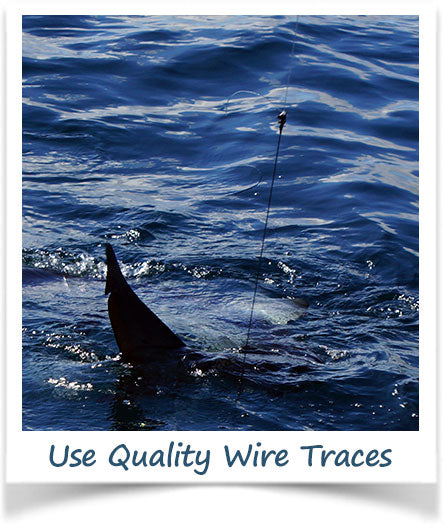There are many different types of fishing wire on the market today. When considering which one to use for making shark traces it can be a little confusing. Before we look at the factors affecting our choice, let’s understand a bit more about the types of wire available.
Fishing wire is typically multistrand stainless steel or single-strand which can be either stainless steel or titanium. Note that I use the word 'fishing' wire... not all wire is suitable for fishing and that's where many people make their mistake.
Single-strand wires are generally used for species such as barracuda, wahoo and other toothy fish (in the lighter sizes, it is also a common component for making traces for pike in the UK). The single-strand offers great bite resistance and in the case of titanium, actually stretches to absorb or cushion the strike. This wire is typically used for shorter bite traces and although some people use it in the heavier sizes for sharks, it is not generally used in the UK for shark traces. A typical bite leader and trace is 14ft to 16ft long. When a shark strikes and fights, the twisting action they impart can kink single strand and this will create a weak link in your tackle set up. Single-strand wire, especially in the heavier gauges will also require twisting using a ‘Haywire’ twist technique rather than crimping which will require a level of knowledge and practice to master with confidence.
Favoured wire for shark fishing traces in the UK is multistrand stainless steel used in conjunction with quality swivels. At Rok Max we use and recommend AFW 49 strand wire because it is the best available. We have seen all sorts of alternative wires. Some are inferior fishing wire, some are not even fishing wire at all. So ask yourself this - would you risk losing the fish of a life time to save a few quid on a cheap trace? American Fishing Wire (AFW) have nearly 40 years’ experience developing and producing quality fishing wire and their products are used with confidence all over the world. The wire has a strong resistance to kinking as well as offering superior bite protection and consistency.
We usually recommend either AFW 49 strand 400lb or 480lbs for the 4ft bite trace, and 12ft of 400lb for the rubbing leader.
AFW 49 strand fishing wire is T302/304 grade stainless steel. This means it is produced to exacting standards. Consistency is key, and this can only be achieved by using superior drawing and stranding processes during the manufacture. Lack of control during this process, especially with cheaper wires results in variable breaking strengths which in turn can lead to mid line breakages. Another issue with inferior wire is fraying or waving when the wire comes into contact with an obstruction, the boat or the sharks teeth when under load.
 Control of the manufacturing process is also critical in the performance of the wire after load. By this we mean that the wire should perform to or similar to the same level in terms of breaking strain after it has been stressed. Some inferior wires may withstand an initial load, for example when a shark strikes, or is even played during the fight but the breaking strain falls away with successive loading until the wire fails. Some inferior wires will not even reach the stated breaking strain. To fish with confidence we believe that you should be able to rely on the wires stated rating. Consider the quality of your wire when you clean and pack away you traces after a session. Can you rely on the strength of your wire next time around? This is even more important if you are a charter boat skipper and provide traces for your customers.
Control of the manufacturing process is also critical in the performance of the wire after load. By this we mean that the wire should perform to or similar to the same level in terms of breaking strain after it has been stressed. Some inferior wires may withstand an initial load, for example when a shark strikes, or is even played during the fight but the breaking strain falls away with successive loading until the wire fails. Some inferior wires will not even reach the stated breaking strain. To fish with confidence we believe that you should be able to rely on the wires stated rating. Consider the quality of your wire when you clean and pack away you traces after a session. Can you rely on the strength of your wire next time around? This is even more important if you are a charter boat skipper and provide traces for your customers.
Think also about the importance of consistency when matching the right diameter wire with the correct size and shape crimps. Using the wrong crimps can result in damage to the wire from over crimping, or slippage due to the crimp not sitting snugly on the wire.
Our AFW wire is carefully matched to the correct size crimps and when used with the appropriate tool will enable you to put pressure on your connections with confidence.
Getting value for money is always important, and shopping for rig making components can get pricey, but with the best wire in say 400lbs costing less than 50p per foot is it worth taking the chance on a cheap alternative? Our customers are frequently encountering unexpectedly large or unidentified adversaries, indeed some of them spend their season specifically targeting the bigger sharks. We will only recommend the best and that’s why we use AFW wire.
Tight lines. Duncan.












